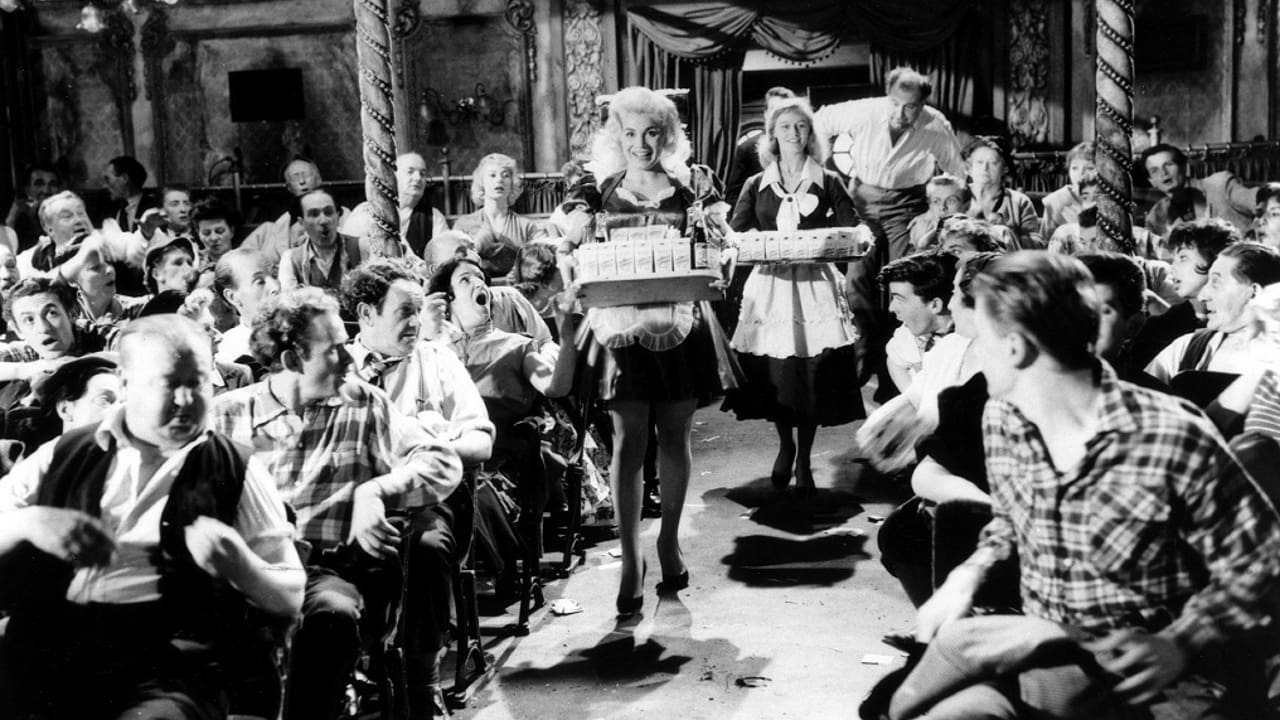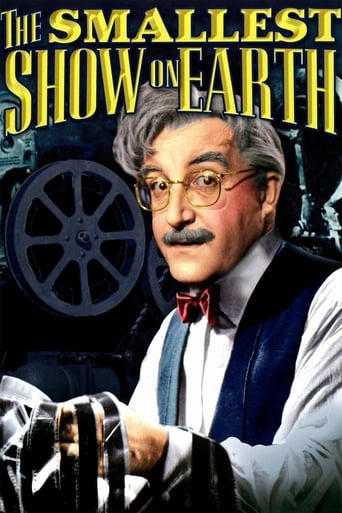

I won't re-say everything that the people who've written comments about the film have already said. It's quite a delightful little film. It's easy for modern audiences to imagine that nothing in black and white could be remotely as funny as any modern film, but after the movie hits its stride the laughs come fast and furious.The one major flaw is that apart from being "morally dubious," the ending smacks of deus ex machina. The film could and should have gone on for another thirty minutes to bring the contention between the two theaters to a more believable conclusion. It's as if the writers suddenly realized they only had about five minutes left of a strict time limit and grabbed at the first straw they could find to wrap it up. But that shouldn't detract from all of the movie BUT the ending, which is a perfectly delightful little comedy.The thing that interests me the most is the historical perspective the movie offers on the era in which it is set. Modern filmgoers might be surprised to see how narrow and small the Bijou's screen is, compared to modern theaters'. It's a 1.33:1 screen, 4:3 like "full-frame" TV sets. That's how the size of television screens was set, in fact; the same as movie theaters of the day.The problem was that people who got televisions were getting in the habit of staying home with the tube rather than going out to the cinema and having to put up with the crowds; in fact, television is specifically mentioned in Smallest Show as being a reason for the decline of business at the Bijou. (Funny how history is repeating itself in this era of the DVD player and home theater.) So, the film industry was looking at doing whatever they could to get butts back in seats.One of those things was cinemascopeor what we would call "widescreen." It is mentioned here in this film, in passing; when the married couple and their lawyer are putting on that conversation for the benefit of the eavesdropper, one of the things they suggest doing is upgrading to cinemascope. The studios hoped that by showing their audience a wider picture than TVs could, they would entice people back to the theater. (They probably did not anticipate all the contention this would eventually cause when widescreen movies were shown on TV-compatible formats, with some people complaining about part of the picture being chopped away and others complaining about black bars on their screen.) Color movies were another such innovation, and so was 3D.But amusingly, and probably unintentionally, Smallest Show also hits upon some of the other things filmmakers triedmost notably William Castle. Castle was famous for enhancing the experiences of his films with gimmicks to make the audience feel like they were "participating" in the filmwiring up theater seats with joy buzzers, flying skeletons over the audience, and so on. If he COULD have shaken the entire theater when a train pulled in on screen, he probably would have. (Although, come to think of it, the Sensurround system a decade later would do more or less exactly that.) And turning up the heat during desert movies would probably have been right up his alley, toothough in his case, cashing in with cold drink sales would probably have been an afterthought.
... View MoreHusband-and-wife team Bill Travers and Virginia McKenna play a newly married couple who inherit a dilapidated cinema (and its elderly, incompetent and equally dilapidated staff), and try to restore it to something like it's original glory. However they soon discover that it's not going to be as easy as perhaps they first thought. There is competition from a huge modern cinema just across the street, which is in need of a car-park. The site of the old "Bijou" would be just the thing.This is a terrific comedy (written by Basil Dearden), and features Peter Sellers, Margaret Rutherford, Bernard Miles as the cinema staff, and Leslie Phillips as the Bijou owner's solicitor.Any American, or indeed any youngster, watching this movie might be slightly bemused, and consider it all a bit implausible. I can tell them that it's not, and so can any Brit over a certain age. When this film was made, every town in the UK had a "flea-pit" (i.e. it's very own "Bijou"). In the town in which I was raised, it was called "The Select".Events depicted in this movie happened at these cinemas on a regular basis. The films shown were usually as decrepit as the cinema itself. (In the case of the "Select" they were usually the awful B&W "horror" movies which no other theatre would show. If the film didn't break at least once, or a reel was put on the projector in time, and/or was not in the wrong order, you were there on a lucky night.) For all of us of the age, to re-watch this little memorial to the old flea-pit, is a real nostalgic blast from the past, and I defy any newcomers to the movie, not to warm to it, either from it's occasional pathos and/or it's hilarious comedy. So go on, take my advice, have a good scratch, and watch it. The film may be fiction, but what you see actually happened!
... View MoreA delightful and unpretentious comedy where all the players, and the director too, seem to be having a lot of fun.From the first reel (or whatever--I first saw it on VHS) there was something markedly different about this movie, I mean different from other British comedies of the era. It seemed somehow very American, I thought. No, that wasn't it at all (I pondered further), it's just that the young leads aren't draped with the usual over-stylization that afflicts most British comedies of the time. And this, to my American eyes, makes them seem normal, i.e., American. It was routine in British movies to make all the characters broad caricatures of one sort or another, so that within the first ten seconds of an individual's appearance you could slot him or her neatly according to class, age, and region. This convention gave us some wonderful character actors (Nigel Bruce, Dame May Witty, Wilfred Hyde-White, Stanley Holloway) and enabled some English directors to develop a quick and cozy rapport with the audience (think of how Hitchcock characters are instantly comprehensible if not always sympathetic). But it also means that leading parts without a funny persona are rare birds indeed. And a clown can may cry but he can never be deep.This movie might be understood as just such a critique of such film-making conventions. Two normal middle-class kids, without any class pretensions or funny accents, find themselves in a tumbledown cinema, surrounded by a repertory company of grotesques. Such monsters are funny in small doses, but if there are too many of them the business can't prosper or be profound. At best it will be merely an amusing shop of curiosities.
... View MoreMatt and Jean are a young married couple who are struggling to get by on his meagre income as a writer. Out of the blue though a letter arrives to tell Matt that he has inherited his uncle's estate (a cinema) and they should travel to see the solicitor as soon as possible. Despite the fact that Matt never knew his uncle, he doesn't look a gift horse in the mouth and they set off to claim what is there's. Arriving in the town they pass a massive cinema and assume they have hit it rich only coming down to earth when the solicitor Robin takes them to the Bijou Cinema, also known as the fleapit. Unable to sell it for enough to cancel out the debts they have inherited, Matt and Jean decide to make the cinema a going-concern to force the buyer to raise his offer.By setting the story in a typically English world of the small local cinema this film will probably appeal to those who are at least 30 years old and live in the UK. Those outside of this group may not be able to buy into the sense of nostalgia that comes with this but they will still find value in the genial sense of comedy that runs across the whole film. The plot is fairly obvious and won't engage on its own terms but is carried by the fine comic air it just about manages to have. The lack of big laughs and genuine wit is a bit of a problem because I always got the feeling that the film was underachieving but it was still just about fun enough to keep me watching. Some of this comes from the writing but mostly it is all very light; no, mostly it is the performances that make it more enjoyable than the material deserves.Travers is not an actor with a great range but he is enjoyable enough as the leading man here; he is greatly helped by his easy chemistry with McKenna, which makes it easier to get into their story and care about them as characters. They are very well supported by simple but enjoyable turns from stalwarts Rutherford, Sellers and Miles. All three had less to do than I would have liked but they are still quite good when given the chance. Smaller roles for Philips, James and De Wolff are generally good and add to the impression that the material is better than it actually is.Overall this is an amiable little comedy; lacking big laughs or real wit but mostly covered by the good cast. Hard to shake the feeling that it could have been better but it is still amusing enough.
... View More